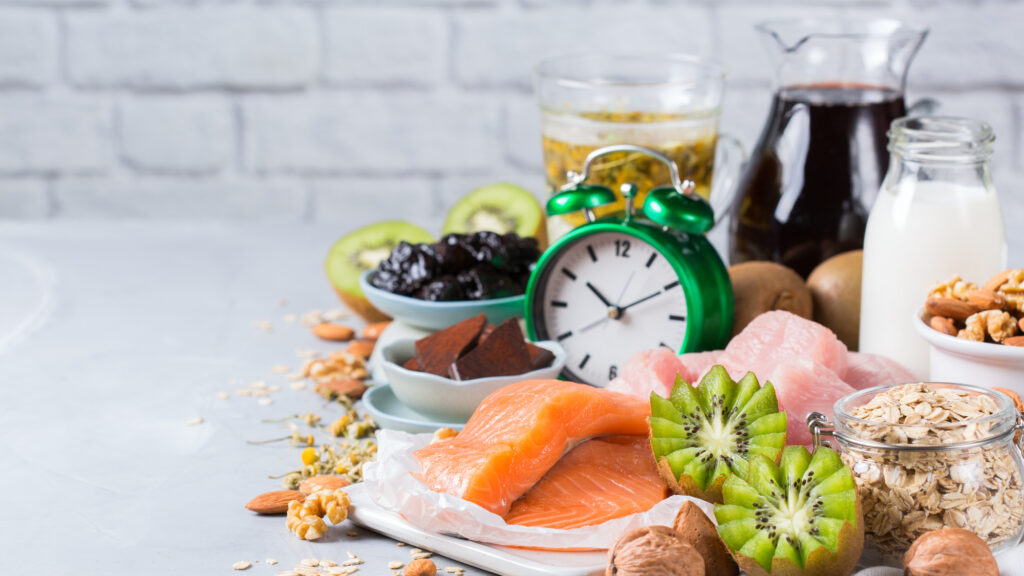
7 foods to help you sleep
Ruth Tierney
Keep your teeth and gums strong and healthy by including these foods in your diet
Looking after your teeth and gums should always be a priority; we all know the importance of twice daily brushing, flossing, and getting regular dental check-ups. As we age, dental health becomes even more important, since your risk of gum disease increases, and healing takes longer.
Looking after your teeth and gums should always be a priority; we all know the importance of twice daily brushing, flossing, and getting regular dental check-ups. As we age, dental health becomes even more important, since your risk of gum disease increases, and healing takes longer.
 Credit: Shutterstock / Dragana Gordic
Credit: Shutterstock / Dragana GordicThe NHS recommends people follow its Eatwell guide for a balanced diet. It has useful information about getting your five-a-day as well as how our meals should be structured for a good balance of different food groups.
But eating well extends beyond just balancing our food groups. What we digest has to pass through our mouths first, and that food affects the health of our teeth and gums.
It’s actually pretty easy to protect your oral health as you eat. While it’s obvious that sugary foods and drinks should be eaten in moderation, some foods can improve your dental health. Here’s a list of food you should try to include in your diet to protect those pearly whites.
 Credit: Shutterstock / eggeegg
Credit: Shutterstock / eggeeggDairy products, such as cheese, milk and yogurt are a good source of calcium, which contributes to healthy bone structure and strengthens teeth. Research has shown that people who drink more milk or eat more cheese are less likely to get cavities.
Production of saliva can slow as we age, leading to a dry mouth, and there’s some evidence that sipping milk can help relieve this. Cheese also contains casein, a form of protein that helps strengthen tooth enamel.
Look for unsweetened or sugar-free dairy products and if you do need to sweeten them, try adding a small amount of honey, as there is some evidence that honey can protect your oral health.
If you’re allergic to dairy or are vegan, choose dairy alternatives, such as nut milks, that are fortified with calcium. Almond milk, for example, may contain vitamins such as vitamin D, which can help the body absorb calcium.
 Credit: Shutterstock / Pearl PhotoPix
Credit: Shutterstock / Pearl PhotoPixRaw carrots and celery are particularly good for dental health, but so are other crunchy veg as they naturally clean the surface of the teeth as we bite.
The high water content also encourages saliva production. Carrots have a lot of vitamin C, and vitamin A, all of which helps tooth health.
Celery contains vitamin A and may also have antioxidant and antimicrobial properties. It has a unique taste; people either love it or loathe it. But if you do like it then it’s a great choice.
 Credit: Shutterstock / Evgeny Karandaev
Credit: Shutterstock / Evgeny KarandaevYou will have heard the saying ‘an apple a day keeps the doctor away,’ and whilst that’s not strictly true, apples do contain useful nutrients like vitamin C, potassium and fibre. And there is some evidence that apples can help keep the dentist at bay.
Apples, like celery, are hard, crunchy, and fibrous. They clean the teeth as we eat and will help to neutralise reduce bacteria reduce bacteria in the mouth.
Munching on an apple after your meal helps aid saliva production, so it’s a great choice for dessert. Make sure you eat the peel, as antioxidant flavonols are only found in the peel.
 Credit: Shutterstock / Pixel-Shot
Credit: Shutterstock / Pixel-ShotVitamin D is important in keeping your teeth (as well as bones and muscles) healthy. There aren’t many foods that are rich in vitamin D, but oily fish such as salmon, sardines, herring and mackerel are good sources.
What’s more, eating oily fish can benefit your heart health at the same time. Vitamin D is also made by the body from sunlight (which is weaker in the winter months) – so the NHS recommends we all consider a vitamin D supplement in the autumn and winter months.
 Credit: Shutterstock / Daisy Daisy
Credit: Shutterstock / Daisy DaisyNuts are a great snack, as they’re low in sugar and are packed full of vitamins and minerals. Almonds, Brazil nuts and hazelnuts are particularly good as they have good amounts of calcium and can help fight the bacteria that can cause tooth decay.
Watch the portion size though. Nuts are high in healthy fats, which might sound good but means they are high in calories, so stick to a small handful.
 Credit: Shutterstock / Rawpixel.com
Credit: Shutterstock / Rawpixel.comBoth black and green tea help to keep your teeth healthy. This is because compounds in tea work to fight bacteria, reduce acid in your mouth and also reduce the enzymes that turn starch into teeth-decaying sugar.
Antioxidants in tea can also help reduce inflammation, something that is important if you suffer from gum disease. Green tea is particularly high in these helpful compounds.
And make sure you’re drinking tea without sugar, otherwise the sugar will undo the benefits of the tea. Sadly, the tannins in tea can stain your teeth – if you’re worried about this, brush your teeth or drink water after each cup of tea.
 Credit: Shutterstock / https://www.shutterstock.com/g/prostock_studio
Credit: Shutterstock / https://www.shutterstock.com/g/prostock_studioLastly, it’s important to remember to drink water. The health benefits of water are endless, and when it comes to preserving dental health, it’s a great choice.
The sugar in fizzy drinks, fruit juice or wine gets turned into acid by the bacteria in your mouth.
In some parts of England, tap water has fluoride added, which protects the teeth. Drinking water also helps get rid of leftover food particles in our mouth.
 Credit: Shutterstock / sirtravelalot
Credit: Shutterstock / sirtravelalotEating a healthy, balanced diet is a great way to protect your health, dental or otherwise. A good mix of different vegetables, some fruit, and plenty of water will all help support our teeth and gums to remain strong.
Along with a regular brushing and flossing routine, don’t forget to visit the dentist for regular check-ups, and contact them if you notice any problems in between appointments.

Written by Becky Fuller she/her
Published: Updated:
Becky Fuller is a fully qualified Personal Trainer, specialising in strength and conditioning for over 50s. Becky’s focus is helping people to become stronger both in body and mind, and to move well without pain. Becky also has many years’ experience working as a freelance journalist, writing for a wide variety of publications such as Screen Rant, Geek Feed, and Daily Actor. She also regularly reviews theatre productions for UKTW.